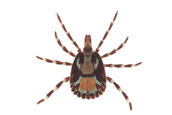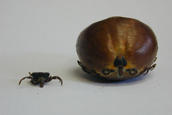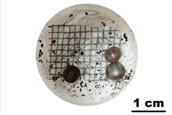Veterinary Medicine in Times of Global Crisis: Largest International Meeting of Tropical Veterinary Medicine in Berlin
September 4–8: Freie Universität Berlin Organizes Meeting for Veterinarians from 55 Countries
№ 285/2016 from Aug 26, 2016
Whether it is swine fever or Bluetongue fever: neither animal diseases nor carriers of pathogens – such as insects or ticks – stop at national borders. In early September more than 250 scientists working in the fields of tropical veterinary medicine and international animal health will meet in Berlin to develop new concepts for teaching and research. The conference will address the following and related issues: What can veterinary medicine do about the increasing antibiotic resistance in animals and humans? How can the spread of infection by insects and ticks be contained? What role does climate change play in the spread of animal diseases? How is it possible to prevent disease from infected foods containing animal products?
The conference Tropical Animal Diseases and Veterinary Public Health: Joining Forces to Meet Future Global Challenges is being organized by the Institute of Parasitology and Tropical Veterinary Medicine and the Centre for Veterinary Public Health, both at the Department of Veterinary Medicine at Freie Universität Berlin. The Centre for Veterinary Health is recognized by the United Nations Food and Agriculture Organization as a FAO Reference Centre. The co-organizers are the Friedrich Loeffler Institute / German Federal Instituts for Animal Health, the German Federal Institute for Risik Assessment, the Life Sciences Faculty of Humboldt-Universität zu Berlin, Veterinarians without Borders (VSF) e.V., and the German Veterinary Society. The conference will be held on the main campus of Humboldt-Universität zu Berlin. The conference language is English.
For the first time the conference is being held jointly under the auspices of the Association of Institutions for Tropical Veterinary Medicine (AITVM) and the Society for Tropical Veterinary Medicine (STVM). It is the largest of its kind. Through panel discussions, scientific lectures, poster presentations, and field trips to scientifc institutions in the region, such as the Potsdam Institute for Climate Impact Research (PIK) and the Leibniz Centre for Agricultural Landscape Research (ZALF) in Müncheberg, the attending scientists will look for joint approaches toward solving urgent problems in international veterinary medicine. The participants and speakers will come from a number of countries, including Egypt, Sudan, or Thailand. Here is a selection of topics and contact persons:
Spread of Animal Diseases
The risk of global spread of animal diseases is on the rise, partly due to international trade of animals and animal products. The outbreak of foot and mouth disease in England in 2001, outbreaks of classical swine fever in Central Europe, or avian flu have shown that diseases do not stop at national borders. Scientists say the increasing proliferation of insects and the pathogens transmitted by them stem from globalization and progressive global warming. The first outbreak of Bluetongue fever in Central Europe was ten years ago, and in 2011 there was an outbreak of infection with the Schmallenberg virus in cattle and small ruminants transmitted by midges (small gnats) native to the region.
Experts on this topic who are available for interviews:
• Ronello Abila (World Organisation for Animal Health in Southeast Asia; coordinator of a campaign against foot and mouth disease in China and Southeast Asia)
• Franz Conraths (Head, Institute of Epidemiology, Friederich Loeffler Institute)
Drug Resistance, Resistance to Antibiotics
Researchers worldwide are finding that antibiotics, insecticides, or medicine against worm infestation are ineffective in more and more animals. Increased drug resistance requires alternative solutions even for the control of ticks and insects. Many presentations at the conference will address the development of vaccines against ticks as well as the development of vaccines that siimultaneously affect the ticks and the pathogens they transmit.
Lecture by Jaap A. Wagenaar, David C. Speksnijder, Dick Heederik: The emerging threat of antimicrobial resistance and interventions: antibiotic stewardship in animal production.
Experts on this topic who are available for interviews:
• Georg von Samson-Himmelstjerna (Institute of Parasitology and Tropical Veterinary Medicine, Freie Universität Berlin; drug resistance in worms)
• Ard M. Nijhof (Institute of Parasitology and Tropical Veterinary Medicine, Freie Universität Berlin; development of vaccine against ticks; artificial feeding of ticks)
Diseases Caused by Infected Food
The growing global trade in animal products increases the risk of spreading disease through infected food and food poisoning across borders.
Experts on this topic who are available for interviews:
• Thomas Alter (Institute of Food Safety and Hygiene, Freie Universität Berlin)
• Karsten Nöckler (Head, Diagnostics and Pathogen Charakterization, German Federal Institute of Risk Assessment)
The opening meeting will be on September 5 at 9 a.m. in the Audimax of Humboldt-Universität (Unter den Linden 6, 10099, Berlin). The following guests of honor have confirmed they will attend: the presidents of AITVM and STVM, the dean of the Life Sciences Faculty, Humboldt-Universität zu Berlin, Prof. Dr. Bernhard Grimm, and the dean of the Department of Veterinary Medicine, Freie Universität, Prof. Dr. Jürgen Zentek. Dr. Maria Flachsbarth, Parliamentary State Secretary in the German Federal Ministry of Food and Agriculture (BMEL), will welcome the international visitors and open the meeting.
Press Photos
The tropical stained tick Ambylomma variegatum (Credit: K. Seidl)
The tropical stained tick Amblyomma variegatum before and after feeding (Credit: A. Nijhof)
View from above on an artificial feeding system of ticks that absorb bovine blood in tick chambers. For the artificail tick feeding, researchers at Freie Universität simulate a piece of skin with a thin layer of silicone. The Institute of Parasitology and Tropical Veterinary Medicine is investigaing how ticks transmit diseases and what drugs can be used to protect against tick infestation. (Credit: K. Seidl)
The photos may be downloaded by members of the media. They may be used free of charge in connection with reporting on the information in this press release, provided that due credit is given.
Further Information
Members of the press may schedule an individual appointment for an interview during the conference. Please contact the Office of News and Public Affairs by Wednesday, August 31, by phone +49 30 838 73180 or email presse@fu-berlin.de
Please indicate who you would like to interview.
Time and Location of the Conference:
- September 4 – 8, 2016, Humboldt-Universität zu Berlin, Unter den Linden 6, 10099 Berlin; plenary sessions in the main auditorium, Audimax (mornings); parallel sessions (afternoons) in the university building at Hegelplatz, Dorotheenstr. 24
- Opening meeting: Monday, September 5 at 9 a.m., Audimax, Humboldt- Universität zu Berlin, Unter den Linden 6, 10099 Berlin



